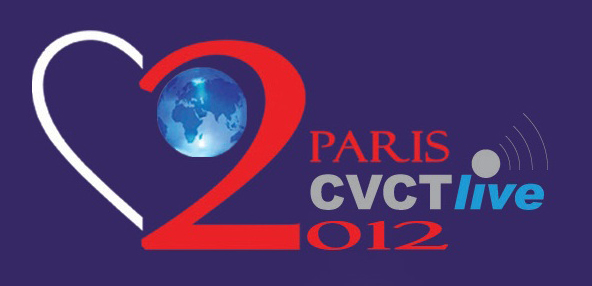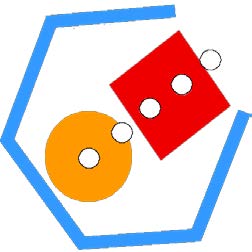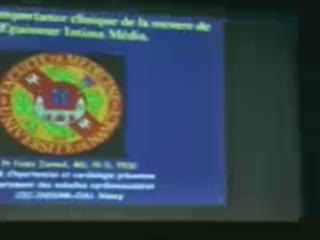Notice
Cardiovascular Clinical Trialists (CVCT) Forum – Paris 2012 : Autonomic modulation therapy for heart failure: Preclinical data and ongoing trials
- document 1 document 2 document 3
- niveau 1 niveau 2 niveau 3
Descriptif
Title : Cardiovascular Clinical Trialists (CVCT) Forum – Paris 2012 : Autonomic modulation therapy for heart failure: Preclinical data and ongoing trials
Speaker: Faiez ZANNAD, Nancy, FRA
Discussant: Gaetano DE FERRARI, Pavia, ITA
Abstract : Autonomic modulation therapy for heart failure: Preclinical data and ongoing trials
L’auteur n’a pas transmis de conflit d’intérêt concernant les données diffusées dans cette vidéo ou publiées dans la référence citée.
9th Global Cardiovascular Clinical Trialists Forum • Paris 2012
HYPERTENSION TRIALIST WORKSHOP: AUTONOMIC MODULATION THERAPY
Chairpersons: George BAKRIS, Chicago, USA - Sverre E. KJELDSEN, Oslo, NOR
Resistant hypertension is usually defined as uncontrolled hypertension despite the intake of at least 3 antihypertensive drugs in full doses including a diuretic. Most investigators would also claim that this also implies 24-hours systolic blood pressure remaining above 135 (or 140) mmHg. Over the years some evidence has accumulated that raised sympathetic nervous system activity is involved in the pathogenesis of hypertension and particularly so in more severe hypertension.
- Ablation of the renal nerves located in the adventitia of renal arteries has emerged as a novel treatment modality and a catheter manufactured by Adrian/Medtronic has been CE approved in Europe based on one RCT (SYMPLICITY -2). A much larger trial is ongoing (SIMPICITY 3). Several other producers have applied for approval.
- CVRx have developed Barostim based on carotid baroreceptors stimulation and have gathered some early experience with encouraging results that led to CE mark.
- These techniques have rapidly been taken up in several countries including in a large number of centers in Germany.
- Beyond resistant hypertension, various devices providing autonomic modulation therapy are entering the clinical development stages also in heart failure, CKD and diabetes.
- Vagal stimulation developed by Medtronic (Biocontrol) and Boston Scientific are being tested in the INOVATE-HF and NECTAR-HF respectively in systolic heart failure.
- Spinal Cord stimulation is considered by many in small proof of concept trials (St Jude SCS HEART) (Medtronic DEFEAT-HF)
- Understanding the differences in the clinical and regulatory environments in the United States and Europe helps explain why much early device testing takes place outside of the United States, and why the introduction of new devices into clinical practice is usually significantly delayed in the United States when compared with Europe.
- Both phenomena are direct results of inherent differences in the criteria for approval and the process required to obtain approval. In particular, the European CE Mark process requires demonstration of safety only (and not efficacy) and relies heavily on non-governmental notified bodies to regulate the approval and post-approval process. In contrast, the approval of a new high-risk device in the United States requires demonstration of both safety and efficacy and is more highly regulated by a central governmental agency (CDRH/FDA).
The aim of this workshop is to assemble primary investigators of a number of important ongoing trials and discuss preliminary results, strengths and limitations of the current trials, efficacy and safety endpoint related issues, as well as issues related to optimal trial design, approvability and implementation into daily clinical practice.
Device companies: CVRx, Medtronic, St. Jude, Marquette, Boston Scientific, Vessix Vascular, ReCor Medical, Adrian, Biosense, Maya Medical.
Réalisation, production : Canal U/3S et CERIMES
Keyword : Cardiovascular Clinical Trialists, Paris, 2012, Cardiovascular prevention, cardiovascular pharmacology, modulation therapy
Dans la même collection
-
Cardiovascular Clinical Trialists (CVCT) Forum – Paris 2012 - Workshop 1 : New indications: Is hear…
DeliargyrisEfthymiosMODIGLIANI Workshop 1 - Friday November 30, 2012 : THE THROMBOSIS TRIALISTS WORKSHOP DOSE AND TARGET PATIENT POPULATIONS ISSUES Chairpersons: Peter CLEMMENSEN, Copenhagen, DEN - George-Andrei DAN,
-
Cardiovascular Clinical Trialists (CVCT) Forum – Paris 2012 - Lunch Session 1 : Industry perspectiv…
WoehrleHolgerMODIGLIANI Lunch Debate Session 1 - Friday November 30, 2012 THE DEVICE THERAPY TRIALISTS WORKSHOP Chairpersons: Gaetano DE FERRARI, Pavia, ITA - Ileana PIÑA, New York, USA Webcast: Tariq AHMAD,
-
Cardiovascular Clinical Trialists (CVCT) Forum – Paris 2012 - Workshop 1 : New indications: Is hear…
PrasadKrishnaMODIGLIANI Workshop 1 - Friday November 30, 2012 : THE THROMBOSIS TRIALISTS WORKSHOP DOSE AND TARGET PATIENT POPULATIONS ISSUES Chairpersons: Peter CLEMMENSEN, Copenhagen, DEN - George-Andrei DAN,
-
Cardiovascular Clinical Trialists (CVCT) Forum – Paris 2012 - Workshop 1 : Different doses, differe…
VerheugtFreekMODIGLIANI Workshop 1 - Friday November 30, 2012 : THE THROMBOSIS TRIALISTS WORKSHOP DOSE AND TARGET PATIENT POPULATIONS ISSUES Chairpersons: Peter CLEMMENSEN, Copenhagen, DEN - George-Andrei DAN,
-
Cardiovascular Clinical Trialists (CVCT) Forum – Paris 2012 - Lunch Session 1 : Non randomized and/…
PocockStuart J.MODIGLIANI Lunch Debate Session 1 - Friday November 30, 2012 THE DEVICE THERAPY TRIALISTS WORKSHOP Chairpersons: Gaetano DE FERRARI, Pavia, ITA - Ileana PIÑA, New York, USA Webcast: Tariq AHMAD,
-
Cardiovascular Clinical Trialists (CVCT) Forum – Paris 2012 - Workshop 1 : New indications: Is hear…
ZannadFaiezMODIGLIANI Workshop 1 - Friday November 30, 2012 : THE THROMBOSIS TRIALISTS WORKSHOP DOSE AND TARGET PATIENT POPULATIONS ISSUES Chairpersons: Peter CLEMMENSEN, Copenhagen, DEN - George-Andrei DAN,
-
Cardiovascular Clinical Trialists (CVCT) Forum – Paris 2012 - Workshop 1 : How to secure the optima…
GibsonMichaelMODIGLIANI Workshop 1 - Friday November 30, 2012 : THE THROMBOSIS TRIALISTS WORKSHOP DOSE AND TARGET PATIENT POPULATIONS ISSUES Chairpersons: Peter CLEMMENSEN, Copenhagen, DEN - George-Andrei DAN,
-
Cardiovascular Clinical Trialists (CVCT) Forum – Paris 2012 - Workshop 1 : Industry viewpoint (Joer…
KoeckJean-LouisMODIGLIANI Workshop 1 - Friday November 30, 2012 : THE THROMBOSIS TRIALISTS WORKSHOP DOSE AND TARGET PATIENT POPULATIONS ISSUES Chairpersons: Peter CLEMMENSEN, Copenhagen, DEN - George-Andrei DAN,
-
Cardiovascular Clinical Trialists (CVCT) Forum – Paris 2012 - Workshop 2 : Well Established Methods…
KoenigWolfgangMODIGLIANI Workshop 2 - Friday November 30, 2012 : ATHEROSCLEROSIS IMAGING IN CLINICAL TRIALS Facilitating the discovery of effective therapies Chairpersons: Jagat NARULA, New York, USA - Ahmed
-
Cardiovascular Clinical Trialists (CVCT) Forum – Paris 2012 - Lunch Session 1 : Options of and alte…
AbrahamWilliam T.MODIGLIANI Lunch Debate Session 1 - Friday November 30, 2012 THE DEVICE THERAPY TRIALISTS WORKSHOP Chairpersons: Gaetano DE FERRARI, Pavia, ITA - Ileana PIÑA, New York, USA Webcast: Tariq AHMAD,
-
Cardiovascular Clinical Trialists (CVCT) Forum – Paris 2012 - Workshop 1 : How to secure the optima…
GellerNancy L.MODIGLIANI Workshop 1 - Friday November 30, 2012 : THE THROMBOSIS TRIALISTS WORKSHOP DOSE AND TARGET PATIENT POPULATIONS ISSUES Chairpersons: Peter CLEMMENSEN, Copenhagen, DEN - George-Andrei DAN,
-
Cardiovascular Clinical Trialists (CVCT) Forum – Paris 2012 - Debate Session 5 : Ultrafiltration fo…
RossiGian PaoloMODIGLIANI Debate Session 5 - Saturday December 1st, 2012 NOVEL DIURETIC STRATEGIES IN HEART FAILURE Chairpersons: Keld KJELDSEN, Copenhagen, DEN - Gian Paolo ROSSI, Padua, ITA Webcast: Patrick
Avec les mêmes intervenants et intervenantes
-
Cardiovascular Clinical Trialists (CVCT) Forum – Paris 2012 - Workshop 1 : New indications: Is hear…
ZannadFaiezMODIGLIANI Workshop 1 - Friday November 30, 2012 : THE THROMBOSIS TRIALISTS WORKSHOP DOSE AND TARGET PATIENT POPULATIONS ISSUES Chairpersons: Peter CLEMMENSEN, Copenhagen, DEN - George-Andrei DAN,
-
Semaine Médicale de Lorraine Nancy 2012 – Hypertension artérielle. Quelle prise en charge ?
ZannadFaiezT0403-06 Titre : Semaine Médicale de Lorraine Nancy 2012 – Hypertension artérielle. Quelle prise en charge ? Intervenant (e)(s) : Faiez ZANNAD (service de Cardiologie – CHU Nancy Brabois) Résumé :
-
Cardiovascular Clinical Trialists (CVCT) Forum – Paris 2012 : Omics research and system biology. Ke…
ZannadFaiezHow future trials may help optimizing benefit-to-risk ratio. The role of specialist scientific organizations. ISCP: Speaker: Felipe MARTINEZ, Cordoba, ARG CVCT: Speaker: Faiez ZANNAD, Nancy, FRA ESC
-
Cardiovascular Clinical Trialists (CVCT) Forum – Paris 2012 : Impact of major clinical trials on ES…
ZannadFaiezTitle : Cardiovascular Clinical Trialists (CVCT) Forum – Paris 2012 : Impact of major clinical trials on ESC Chronic Heart Failure 2012 guidelines. Game changer trials: EMPHASIS-HF, SHIFT, Devices…
-
Forum Sante : Vers un coeur immortel
KhalifeKhaliféZannadFaiezForum Santé : Vers un coeur immortel ?
-
Semaine de la Recherche Thérapeutique 26-03-09 Faïez ZANNAD
ZannadFaiezSemaine de la Recherche Thérapeutique, Faëz ZANNAD, Diabète, Cholestérol, Obésité
-
Semaine de la recherche thérapeutique - Faïez ZANNAD
ZannadFaiezConférence de Faïez ZANNAD pour le Débat Décideur
-
10ème colloque de biologie prospective-Epaisseur Intima-Média
ZannadFaiezLe complexe entre l'intima et la média est l'endroit ou se développe l'artéro-sclérose . L'épaisseur intima-media se produit plus tardivement chez les femmes que chez les hommes . Les facteurs de




















